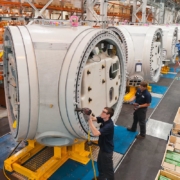Manufacturing is Critical to Our National Defense
Manufacturing is Critical to Our National Defense
The final reason that manufacturing is important is that manufacturing ensures that the U.S. has a strong industrial base to support its national security objectives. We need to preserve our national and homeland security to be able to produce the goods that allow us to defend our national sovereignty.
American manufacturers supply the military and Defense Department with the essentials needed to defend our country, including tanks, fighter jets, submarines, unmanned vehicles (drones) and other high-tech equipment. The same advances in technology that consumers take for granted support the military, particularly soldiers fighting overseas.
In the keynote address “Lessons for a Rapidly Changing World” at the CA World conference in 2003, Dr. Henry Kissinger, former U.S. Secretary of State, said,
“The question really is whether America can remain a great power or a dominant power if it becomes primarily a service economy, and I doubt that. I think that a country has to have a major industrial base in order to play a significant role in the world. And I am concerned from that point of view.” He added, “But if the outsourcing would continue to a point of stripping the U.S. of its industrial base and of the act of getting out its own technology, I think this requires some really careful thought and national policy probably can create incentives to prevent that from happening.”
As more and more manufacturing was outsourced offshore, the warnings of the dangerous consequences continued. Joe Muckerman, former director of emergency planning and mobilization in the Office of the Secretary of Defense, wrote a guest editorial entitled “Without a Robust Industrial Base DOD Will Lose Future Wars” in the April 17, 2008 edition of Manufacturing & Technology News. He opined:
Joe Stalin said that World War II was not won on the battlefields of Europe but in Detroit. Had Stalin lived until the end of the Cold War, he probably would have arrived at a similar conclusion. The U.S. won the Cold War because it maintained technologically superior strategic weapons at a level that deterred the Soviet Union from attacking our vital interests. The United States was able to sustain this force for half a century during which the U.S. economy prospered while that of the USSR collapsed. … Today the U.S. industrial base is fast becoming global and the U.S. economy is in trouble.
In April 2011, the Information Technology & Innovation Foundation (ITIF) released the report, “The Case for a National Manufacturing Strategy,” by Stephen Ezell and Robert Atkinson which echoed my strong belief that manufacturing is critical to our national security:
They wrote, “If we lose our preeminence in manufacturing technology, then we lose our national security. This is because:
- As the U.S. industrial base moves offshore, so does the defense industrial base.
- Reliance on foreign manufacturers increases vulnerability to counterfeit goods.”
The report revealed that the
“United States has diminishing or no capability in lithium-ion (Li-ion) battery production, yttrium barium copper oxide high-temperature superconductors, and photovoltaic solar cell encapsulants, among others. … Additional examples of defense-critical technologies where domestic sourcing are endangered include propellant chemicals, space-qualified electronics, power sources for space and military applications (especially batteries and photovoltaics), specialty metals, hard disk drives, and flat panel displays (LCDs).”
On July 21, 2017, President Trump issued Exec. Order 13806, “Assessing and Strengthening the Manufacturing and Defense Industrial Base and Supply Chain Resiliency of the United States,” whose “primary goal was to conduct a comprehensive assessment of the industrial base and develop a set of specific, actionable recommendations to mitigate or eliminate the identified impacts.”
In December 2017, President Trump set forth “The National Security Strategy of the United States of America,” to put American First in which he stated, “A healthy defense industrial base is a critical element of U.S. power and the National Security Innovation Base. The ability of the military to surge in response to an emergency depends on our Nation’s ability to produce needed parts and systems, healthy and secure supply chains, and a skilled U.S. workforce.” Since then, President Trump’s economic policies have focused on putting America First to protect our national security through the following:
- Renegotiating NAFTA and KORUS
- Corporate and personal tax cuts
- Regulatory reform
- Tariffs on steel, aluminum, and other Chinese goods tax cuts
- Strengthening Buy America requirements for federal government procurement
As required by E.O. 13806, on Oct. 5, 2018, Deputy Secretary of Defense Pat Shanahan, on behalf of Secretary of Defense Jim Mattis, presented the report, “Assessing and Strengthening the Manufacturing and Defense Industrial Base and Supply Chain Resiliency of the United States,” to President Trump. Note: The unclassified version is available here. This 146-page report comprehensively assesses every aspect of the defense industrial base.
One important factor noted was
“The decline in the U.S. manufacturing industry, relative to prior periods of great power, creates a variety of risks for America’s manufacturing and defense industrial base and, by extension, for DoD’s ability to support national defense. Risks range from greater reliance on single sources, sole sources, and foreign providers to workforce gaps, product insecurity, and loss of innovation.”
The U.S. cannot rely on other countries to supply its military because their interests may run counter to its own. If we faced a real military threat to our homeland, how would we assure access to the industrial and military goods needed to defend our country when most of these items are being manufactured in China? We cannot risk being held hostage to foreign manufacturers when it comes to products that are essential for our national security and the U.S. military. The COVID-19 pandemic has taught us that we must source critical pharmaceuticals, PPE, and medical devices in the U.S. to protect the health and safety of American citizens.
In turn, it is crucial that key components and technologies that are critical to the production of U.S. weapons and other products needed by our military and Department of Defense be produced within the United States. This is the only way that we will be able to protect our national security and keep America a free country.









Leave a Reply
Want to join the discussion?Feel free to contribute!